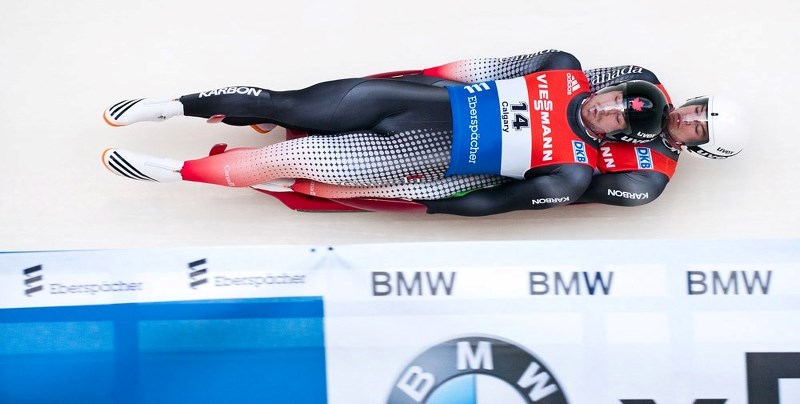Nothing like a little home cooking to shake the rust off the rails.
After crashing in Austria and placing ninth in Lake Placid to open the International Luge Federation Viessmann World Cup season, Cochrane luger Tristan Walker and doubles teammate Justin Snith of Calgary came home to bronze. Their Luge Canada doubles sled placed third Dec. 12 at WinSport’s Canada Olympic Park bobsleigh/luge track in front of cheering Canadian fans.
“Really, really nice to go into the break with a medal under the belt,” a beaming Walker said on the finish dock following the race. “We were, I want to say planning on it, but we were kind of hoping – coming from last season with our first podium ever and coming so close at the Olympics – that we would be up there pushing for medals this year. And this just proves we can do it. It’s possible for us to do it.
“It’s really nice to turn around that slow start to the season.”
Consistency was the key for the Canadian doubles sliders who just missed out on bronze medals at the Winter Olympic Games in Sochi, Russia, in February. Knowledge of their home track, running in fast conditions on a warm-ish, (5 degrees C) non-windy Calgary day, helped as they found the third-fastest line over two runs down the 10-turn, 1,081-metre track. They finished with a time of one minute, 28.014 seconds.
The German doubles teams of Toni Eggert and Sascha Benecken, and Tobias Wendl and Tobias Arlt claimed gold and silver respectively at the Calgary World Cup doubles event.
“We had two runs that were good enough,” said Snith. “I can’t say I’m overly happy with the second run. There were a couple mistakes on the bottom that thankfully didn’t cost us too much time.”
The difference between training times and race times was particularly noticeable. Walker and Snith were sliding in the 45-second-per-run range during Dec. 10-11 training and had it down to 43-44 in the Dec. 12 race.
“We might be sand-bagging a little bit,” Snith cracked.
“From training to race, there are a lot of big differences. I’d say there is probably about a second, second and a half in just the equipment you wear,” Walker related. “Between that and the sled prep, we put a lot more work into the sled for a race. I’d say, generally, there’s about a second in just gear going from training to race. But that other second was definitely better runs.”
Walker and Snith were close to taking another medal in the one-run Sprint Cup on Dec. 13, finishing fourth, 29/1000ths of a second behind the third-place Latvia sled.




